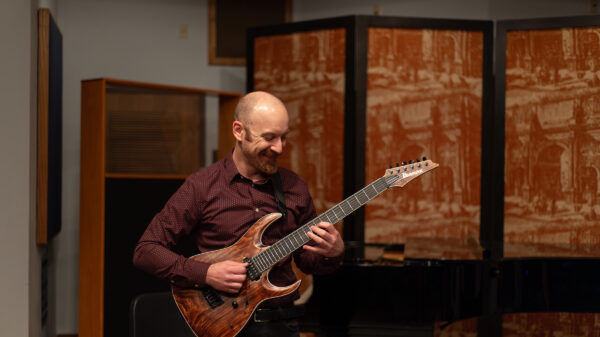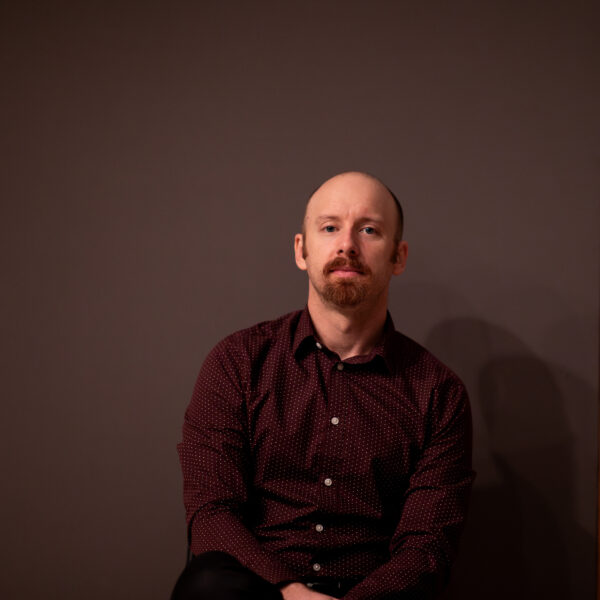Wham! The sound of Russell Podgorsek’s body slamming into the floor echoes throughout the highest reaches of Bates Recital Hall. Skillfully rolling to his feet, the UT-based composer, building manager and aikido instructor turns to face his opponent and fellow practitioner Nicole Vaughan. But this isn’t your everyday martial arts demonstration.
As Vaughan hurls Podgorsek to the ground again, a playful trumpet melody floats across the stage, joined by a lilting chorus of wind, brass and the jaunty beat of a snare drum. A mezzo-soprano belts:
A woman who knows jiujitsu …
she may bring great burly cowards
nearly twice her size to their knees
and make them howl for mercy!
“What Every Woman Ought to Know” debuted at the Butler School of Music in 2017. Podgorsek’s piece, composed for a mixed ensemble and two martial artists, speaks volumes about performance art and social consciousness. The work, inspired by the early 20th century writings of martial artist Edith Margaret Garrud, commemorates the Englishwoman’s legacy of teaching jiujitsu to suffragettes, women activists fighting for their voting rights. Vaughan plays a suffragette, and Podgorsek plays, in his words, “the unfortunate assailant.”
“While this piece will be entertaining, and funny at times, it should also be a reminder that we have to be vigilant against misogyny and discrimination, even in our own backyards,” he announced at the premiere.
A Butler School alumnus, Podgorsek wears multiple hats while working at UT. As a staff member, he oversees the Butler’s daily facilities operations in his role of building manager. As a faculty member and lecturer, he teaches students majoring in music composition.
“Engaging with students from a standpoint of musical aesthetics and then walking out the door to deal with a huge coffee spill or new combinations for instrument lockers makes me feel like I’m a part of the Butler community that people can engage with at every level,” says the New Jersey native.
Podgorsek is also an instructor at the Austin Iwama Aikido dojo, a Japanese martial art school. This will be his 15th year of practicing the century-old art, which prioritizes self-defense.
“It’s been a great foil to music. … Learning how to use your body and knowing how it works is critical when playing an instrument,” he explains, demonstrating a basic aikido position. The pose, with wrists rotated inward, resembles a violinist lifting the instrument to their chin. “Our bodies are instruments, and learning how to use mine really helped my music.”
As a teenager in the ’90s, Podgorsek uncovered his passion for music while watching a performance by progressive metal band Dream Theater on MTV. Captivated by the guitarist’s stunningly complex and virtuosic solos, Podgorsek began playing guitar around the house.
“It became an interest that I really felt was my own,” he says. “I had never heard guitar playing like that. When I started taking music theory in high school, I learned about classical music and heard it the same way as metal music. Both genres have this remarkable structure, clarity and virtuosity.”

Drawn into the world of stringed instruments, Podgorsek learned to play the violin in his high school orchestra, all the while listening to Metallica and Haydn, Megadeth and Beethoven. When the budding composer wasn’t studying Bach’s Brandenburg Concertos, he was testing out new guitar solos with his metal band, Bloodrite.
“We were terrible,” he says, laughing.
Once Bloodrite dissipated and Podgorsek graduated from high school, he completed composition degrees at the University of Dayton in Ohio and the University of Hartford in Connecticut, often performing on violin, viola or guitar in self-composed pieces.
“I wouldn’t trade the experience for anything,” he says. “Pursuing music and trying to re-create something beautiful for audiences changed who I was.”
When he began his doctoral studies at UT, Podgorsek worked as a curator in the Fine Arts Library, developing an interest in arts management. After graduation, he accepted the full-time position of Butler’s building manager in 2014.
“Once you get into your 30s with an arts degree, you start to ask questions about what you really want for your career,” Podgorsek says. “Steve Reich (the American composer) worked for the post office. I needed to pay off student loans, so I got into building management.”
The unusual collection of items that live in Podgorsek’s office reflect his role as Butler’s resident jack-of-all-trades. A rolling cart full of screwdrivers, nails and tape measures sits beside an upright piano. A faded yellow guitar amp lurks behind piles of musical scores and large sheets of paper displaying the faint, penciled-in beginnings of new compositions.
“The building itself and all the operations here are really demanding,” says Podgorsek, who manages Butler’s access hours as well as projects ranging from classroom IT upgrades to large-scale construction.
While the brown brick corner in the northeast corner of campus may seem sleepy at times, the pointy-bearded staff member always has to be on his toes, whether it be to remove unwanted intruders from the building or address — in his words — a “savagely clogged toilet.”
During the pandemic, Podgorsek was tasked with addressing Butler’s biggest problem yet: The winch system suspending the light canopy above Bates Recital Hall had jammed. He quickly assembled a maintenance crew and a mechanical specialist to repair the winch.
This year, he’s overseeing acoustic renovations in the Longhorn Band Hall, as well as polishing a large-scale piece that the UT Symphony Orchestra will premiere in December. Podgorsek takes pride in his multi-faceted role at Butler and is looking forward to continuing to teach music composition.
“There’ve been a few people who I’ve impacted during their time here, and that’s what means the most to me,” he says. “Someone at my aikido dojo told me that the first thing they noticed about me is that I treat everybody the same, and I think I’ve cultivated that practice while working at Butler. Students, faculty and staff come talk to me about anything, whether they’re discussing high-concept stuff or just being real. There’s a fluidity there, and it’s a great feeling.”



